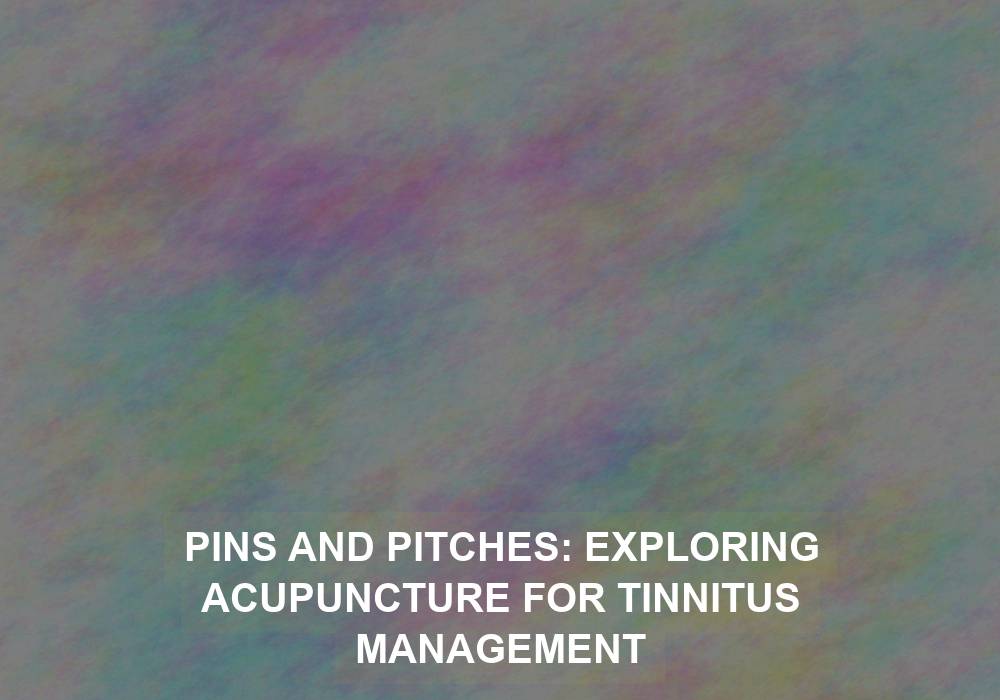When it comes to managing tinnitus, a condition characterized by ringing or buzzing sounds in the ears, there are various treatment options available. One alternative therapy that has gained attention in recent years is acupuncture. In this article, we will delve into the world of acupuncture and its potential benefits for tinnitus management.
Understanding Tinnitus
Before we explore the potential benefits of acupuncture, let’s first understand what tinnitus is. Tinnitus is not a disease itself but a symptom of an underlying condition. It can manifest as a perceived sound in one or both ears, such as ringing, buzzing, hissing, or even roaring. This condition can affect people of all ages and can be temporary or chronic.
Tinnitus can have a significant impact on a person’s quality of life, causing sleep disturbances, difficulty concentrating, and increased stress levels. It is important to address tinnitus symptoms and explore treatment options that can provide relief.
The Basics of Acupuncture
Acupuncture is an ancient Chinese medical practice that involves the insertion of thin needles into specific points on the body. These points, known as acupoints, are believed to be connected to energy pathways or meridians in the body. By stimulating these acupoints, acupuncture aims to restore the flow of energy and promote overall well-being.
Acupuncture is based on the concept of balancing the body’s energy, known as Qi (pronounced “chee”). According to traditional Chinese medicine, when Qi is disrupted or blocked, it can result in various health issues, including tinnitus. By targeting specific acupoints, acupuncture seeks to restore the balance of Qi and alleviate symptoms.
Acupuncture for Tinnitus Management
While the exact cause of tinnitus is often unknown, several factors such as age-related hearing loss, exposure to loud noises, earwax blockage, and certain medications can contribute to its development. Acupuncture, as an alternative therapy, is thought to address these underlying factors and potentially alleviate tinnitus symptoms.
Potential Benefits of Acupuncture for Tinnitus
- Improved Blood Circulation: Acupuncture is believed to enhance blood circulation, which can have a positive impact on the functioning of the auditory system. By improving blood flow to the ear, acupuncture may help reduce tinnitus symptoms.
- Increased blood flow can provide necessary nutrients and oxygen to the ear, promoting its health and reducing the severity of tinnitus.
- Enhanced circulation can also help remove any toxins or waste products that may be contributing to tinnitus symptoms.
- Stress Reduction: Stress and anxiety can exacerbate tinnitus symptoms. Acupuncture has been shown to promote relaxation and reduce stress levels. By addressing stress, acupuncture may indirectly alleviate tinnitus distress.
- Acupuncture sessions can create a calming and therapeutic environment, allowing individuals to relax and release tension.
- The stimulation of acupoints during acupuncture triggers the release of endorphins, which are natural mood enhancers and can help reduce stress and anxiety.
- Endorphin Release: Acupuncture stimulates the release of endorphins, the body’s natural painkillers and mood enhancers. This release may provide relief from tinnitus-related discomfort and improve overall well-being.
- Endorphins can help reduce pain perception, including the discomfort associated with tinnitus.
- The mood-enhancing effects of endorphins can contribute to a more positive outlook and better coping mechanisms for individuals with tinnitus.
- Nervous System Regulation: Acupuncture is believed to regulate the nervous system, which plays a crucial role in auditory processing. By restoring balance to the nervous system, acupuncture may help reduce tinnitus severity.
- The nervous system controls the transmission of signals between the ear and the brain. By regulating its activity, acupuncture may optimize auditory processing and reduce tinnitus symptoms.
- Acupuncture can help modulate the hyperactivity of neurons that may contribute to tinnitus, leading to a decrease in the perception of phantom sounds.
The Acupuncture Process
If you decide to explore acupuncture for tinnitus management, it’s essential to consult a qualified acupuncturist. During your initial visit, the acupuncturist will assess your overall health and discuss your tinnitus symptoms in detail. Based on this evaluation, a personalized treatment plan will be created.
During an acupuncture session, the acupuncturist will insert thin needles into specific acupoints on your body. The needles are typically left in place for around 20 to 30 minutes while you relax. The number of sessions required may vary depending on the severity of your tinnitus and your body’s response to treatment.
Acupuncture is generally considered safe when performed by a trained professional. However, it’s important to keep a few considerations in mind:
Choose a Qualified Practitioner: Ensure that your acupuncturist is licensed and has proper training and certification. This will guarantee that you receive safe and effective treatment.
Discuss with Your Healthcare Provider: Before starting acupuncture or any other alternative therapy, it’s crucial to consult your healthcare provider. They can provide guidance and ensure it doesn’t interfere with any existing treatments or medications.
Individualized Approach: Each person’s experience with tinnitus and response to acupuncture may vary. It’s essential to have realistic expectations and be patient, as it may take several sessions to notice significant improvements, if any.
Conclusion
Acupuncture, as an alternative therapy, holds promise for tinnitus management. By addressing underlying factors, promoting relaxation, and regulating the nervous system, acupuncture may provide relief from tinnitus symptoms. However, it’s important to approach acupuncture as part of a comprehensive treatment plan and consult a qualified practitioner. Remember to communicate effectively with your healthcare provider and have realistic expectations throughout the process. With the potential benefits it offers, acupuncture can be a valuable addition to the range of treatment options available for tinnitus.
